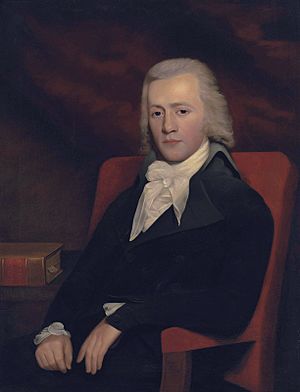William Erskine, Lord Kinneder facts for kids

William Erskine, Lord Kinneder (1768–1822) was a close friend of the famous writer Sir Walter Scott. He was also a smart scholar and a songwriter.
Contents
Early Life and Learning
William Erskine was born in 1768 in Muthill, Scotland. His father, also named William Erskine, was a minister in the Scottish Episcopal Church.
William went to the University of Glasgow for his education. While studying there, he lived with Andrew Macdonald, who was a clergyman and writer. From Macdonald, William developed a strong love for old English literature.
A Career in Law and Literature
William Erskine became a lawyer in Scotland on July 3, 1790. He soon became a very close friend and trusted literary advisor to Sir Walter Scott.
Friends with Sir Walter Scott
In 1792, Erskine, Scott, and other young lawyers started a group to study German. Erskine was a great classical scholar, meaning he knew a lot about ancient Greek and Roman writings. This knowledge helped Scott a lot when he was studying German plays and stories. Erskine was known for being very strict about what he thought was good writing.
Erskine helped Scott by arranging for his translation of a German poem called Lenore in 1796. Later, when Scott became a famous author, he only trusted two people to check his work for small mistakes: James Ballantyne and William Erskine. Erskine was the one Scott would ask if he wasn't sure about advice from his publisher.
Erskine and Scott even pretended that Erskine wrote parts of Scott's poem The Bridal of Triermain. They wrote a special introduction to trick people into thinking it was true!
Erskine's Important Roles
Scott dedicated the third part of his famous poem Marmion to Erskine in 1808. This shows how much Scott valued their friendship.
On June 6, 1809, Erskine was made the sheriff of Orkney. A sheriff back then was a judge and a local leader. In 1814, Scott joined Erskine and other friends on a trip to Orkney, a group of islands north of Scotland.
Erskine also helped Scott write a review of Scott's own novel, Old Mortality, for the Quarterly Review. This review defended Scott's book against some critics.
Becoming Lord Kinneder
Thanks to Scott's hard work and support, William Erskine was promoted to a higher court in January 1822. He became a judge and was given the title of Lord Kinneder.
Sadly, Erskine became very unwell after this promotion. He passed away on August 14, 1822. Scott was very sad about losing his friend. He said that if anyone had a pure spirit, it was William Erskine. Scott even worked to get a pension for Erskine's daughters after his death.
Erskine was known as the only close friend of Scott who didn't enjoy the same rough outdoor activities that Scott loved. Erskine also wrote several Scottish songs.
Family Life
On September 13, 1800, Lord Kinneder married Euphemia Robison. She was the only daughter of Professor John Robison, a physicist. Euphemia passed away in September 1819 and was buried in Saline, Fife. Sir Walter Scott wrote a special message for her tombstone.
William and Euphemia had several children:
- Euphemia (1801–1852)
- Helen Drummond (1803–1829)
- William (1805–1811)
- Mary Anne (1807–1881)
- Jane (1809–1837)
- John (1810–1846)
- William (1813–1901)
- An infant daughter who died in 1817
Images for kids
-
William Erskine, Lord Kinneder (1768–1822) (painted by the circle of Henry Raeburn)
 | Selma Burke |
 | Pauline Powell Burns |
 | Frederick J. Brown |
 | Robert Blackburn |


